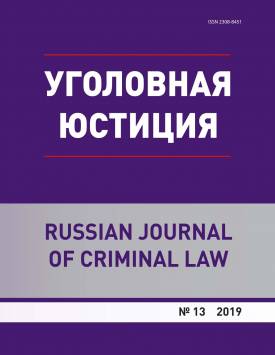Preparatory Actions of a Court of Cassation on a Criminal Case
Federal Law No. 361-FZ of 11 October 2018 introduced a new procedure for the consideration of all cassation appeals against final court decisions at court hearings. This raised an urgent problem in the criminal procedure science: the role of the court of cassation in preparing a criminal case for a cassation trial, the optimal procedure for checking the compliance of cassation appeals with formal requirements and the possibility of eliminating the shortcomings of appeals. The updated version of Chapter 47.1 of the Code of Criminal Procedure of the Russian Federation contains significant gaps in the regulation of the preparatory actions of the court of cassation, which requires adjustment. The object of the research is criminal procedure relations that are formed in the implementation of the norms of criminal procedure law governing cassation proceedings in the criminal procedure. The subject of the research is the provisions of the Constitution of the Russian Federation, the generally accepted principles and norms of international law, the provisions of the science of the criminal procedure, the totality of criminal procedure rules governing cassation proceedings. The aim of the study is to identify the essence of the introduced legislative changes relating to the stage of preparation of a criminal case for cassation proceedings, to determine the objectives of the court of cassation at this stage and its terms of reference. Methods of analysis, synthesis and comparison were used to determine the role of the court of first instance in preparing a case for cassation proceedings. Historical legal and comparative legal methods were used to study national historical forms and foreign forms of cassation proceedings. The formal legal method was used to analyze the content of texts of legal acts regulating cassation proceedings. The absence of legal provisions on no progress on a cassation appeal for the applicant to eliminate its shortcomings does not correspond to the objectives of the new cassation appeal procedure against the final court decisions. The procedure for returning a cassation appeal by the cassation court envisages a repetition of preparatory actions by the court of first instance, which contradicts the requirements of reasonableness of the terms of criminal proceedings. The requirements for the content of a cassation appeal need to be changed, taking into account the essence of the new cassation appeal procedure of the final court decisions.
Keywords
кассационное обжалование,
итоговое судебное решение,
суд кассационной инстанции,
суд первой инстанции,
кассационная жалоба,
cassation appeal,
final court decision,
cassation court,
court of first instance,
cassation appealAuthors
| Spiridonov Mikhail S. | Stavropol Regional Court | mishok84@mail.ru |
Всего: 1
References
Собрание законодательства РФ. 2018. № 42 (ч. II). Ст. 6375.
Червоткин А.С. Новый порядок пересмотра судебных решений: что изменится в апелляции и кассации // Уголовный про цесс. 2018. № 9. С. 46-53.
Омарова А.С. Кассационное производство как форма юридической проверки законности судебных актов : дис.. канд. юрид. наук. Волгоград, 2015. 242 с.
Колоколов Н.А. Глубокая модернизация «советской» судебной системы // Российская юстиция. 2011. № 4. С. 29-33.
Бюллетень Верховного Суда РФ. 2014. № 4.
Потапов В. Возвращение кассационной и надзорной жалобы / представления без их рассмотрения по существу: основания и порядок // Уголовное право. 2012. № 2. С. 97-101.
Омарова А. С. О некоторых промежуточных решениях в новом порядке кассационного производства // Российский судья. 2014. № 1. С. 40-42.
Уголовно-процессуальный кодекс Грузии. URL: https://matsne.gov.ge/ru/document/view/90034?publication=101 (дата обраще ния: 13.01.2019).
Rigi Teataja. URL: https://www.riigiteataja.ee/akt/130122014009 (дата обращения: 11.01.2019).
Уголовно-процессуальный кодекс Украины. URL: http://kalinovsky-k.narod.ru/zakon/UPK_Ukraini_2012.htm (дата обращения: 11.01.2019).
Уголовно-процессуальный кодекс Азербайджанской Республики. URL: http://online.zakon.kz/Document/?doc_id= 30420280#pos=4570;-57 (дата обращения: 14.01.2019).
Нехороших М.Е. Кассационное производство: сущность, задачи и направления совершенствования : дис.. канд. юрид. наук. Томск, 2018. 288 с.
Устав уголовного судопроизводства. С позднейшими узаконениями, законодательными мотивами, разъяснениями Правительствующего Сената и циркулярами Министра Юстиции / сост.: В.П. Ширков, М.П. Шрамченко. 4-е изд., пересмотр. и доп. СПб. : Изд. юрид. кн. магазина Н.К. Мартынова, 1909. 1192 с.
Щегловитов С.Г. Судебные уставы Императора Александра II с законодательными мотивами и разъяснениями. Устав уголовного судопроизводства. СПб., 1913. 948 с.
ДуховскойМ.В. Русский уголовный процесс. М., 1902. 492 с.
Головненков П., Спица Н. Уголовно-процессуальный кодекс Федеративной Республики Германия : научно-практический комментарий и перевод текста закона. Потсдам, 2012. 404 с.
Колоколов Н. Уплотнение нынче в моде. Комментарий к изменениям, внесенным в уголовно-процессуальное законодательство РФ // Юридическая газета. 2011. № 7. С. 11-13.
Практика применения Уголовно-процессуального кодекса Российской Федерации. Ч. 2: Актуальные вопросы судебной практики, рекомендации судей Верховного Суда РФ по применению уголовно-процессуального законодательства на основе новейшей судебной практики : практ. пособие / под ред. В.М. Лебедева. 7-е изд., перераб. и доп. М. : Юрайт, 2016. 395 с.
Ковтун Н.Н. Кассационное производство: насколько оправданы лапидарные разъяснения пленума // Уголовное судопроизводство. 2014. № 2. С. 26-30.
Колмаков П., Обухов И. Возвращение надзорных жалоб и представлений ввиду их несоответствия требованиям ст. 375 УПК РФ // Уголовное право. 2010. № 3. С. 80-84.
Колоколов Н.А. Производство в суде надзорной инстанции: проблемы остаются // Юрист. 2005. № 29. Доступ из справ.-правовой системы «КонсультантПлюс».
Курс русского уголовного судопроизводства, составленный по лекциям профессора СПб. университета И.Я. Фойницкого и изданный в руководство слушателям 1884-1885 года. СПб. : Я. Кудрицкий и Д. Богословский, 1884-1885. Т. 2. 785 с.

